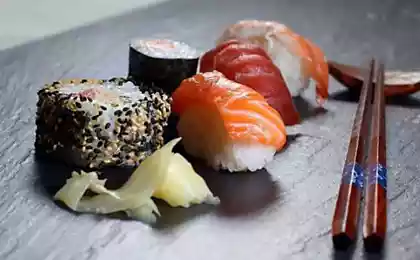238
Common myths about Sushi
Sushi is one of the healthiest and tastiest dishes popular around the world. It is a traditional Japanese food passed down from generation to generation. Unfortunately, there are many myths around sushi that can scare potential consumers. In this article, I will try to dispel the 6 most common myths about sushi that are not true.
1. Sushi is made from raw fish
That's the biggest misconception. Raw fish is just one element of sushi, and some dishes do not have fish at all, being completely vegetarian. Some sushi is cooked with pickled fish and some with boiled shrimp. In fact, the variant of sushi with raw fish is called sashimi. But most sushi is made from dried leaves of seaweed, rice and tuna, or salmon.
2. Such a mistake can ruin the entire dish, given that soy sauce is not suitable for many components used in sushi. The sauce that is usually served in restaurants is called Nikiri. It combines soup, soy sauce, sake and spices. Every chef has their own recipe for nickiri. However, such a sauce is recommended to serve only to sashimi, because there is no danger of interrupting the tastes of other ingredients.
3. You should always add wasabi Vasabi – a component with a very strong aroma that can outshine all other dishes. Some Japanese chefs view adding more wasabi as an offensive gesture because they have already added the required amount during cooking. It may seem that wasabi is added in order to beat the taste of the dish you do not like.
4. Unfortunately, today this rule cannot correspond to reality. There are numerous ways that stale fish can be returned to a healthy color, one of which is carbon dioxide. Although this method is not used in famous restaurants, no one can guarantee quality by simply looking at the color of the fish.
5. Marinated ginger, which accompanies sushi, should not be used as a side dish. It is used to clean the sky after each type of sushi. Given that sushi food contains several types of fish, ginger is meant to relax your taste buds. Here you can draw parallels with sherbet in European cuisine.
6. Although the habit of drinking sake with each dish is becoming more common, traditional sushi is served with beer. Therefore, good restaurants first serve snacks and salads so that those sitting at the table can have some sake.
Sushi is a healthy and tasty dish that is a good source of protein, carbohydrates, vitamins and minerals. Most importantly, it has a low fat content. Since fish is a key component of sushi, there are some risks, in addition to the benefits mentioned. Tuna, for example, contains high levels of mercury and if consumed in large quantities, can cause health problems. In addition, if sushi is not cooked properly, digestive problems can occur, as well as parasites can be transmitted very easily. Since sushi is a salty dish, it can be dangerous for people with hypertension or kidney disease.
Source: lifeglobe.net/
1. Sushi is made from raw fish
That's the biggest misconception. Raw fish is just one element of sushi, and some dishes do not have fish at all, being completely vegetarian. Some sushi is cooked with pickled fish and some with boiled shrimp. In fact, the variant of sushi with raw fish is called sashimi. But most sushi is made from dried leaves of seaweed, rice and tuna, or salmon.
2. Such a mistake can ruin the entire dish, given that soy sauce is not suitable for many components used in sushi. The sauce that is usually served in restaurants is called Nikiri. It combines soup, soy sauce, sake and spices. Every chef has their own recipe for nickiri. However, such a sauce is recommended to serve only to sashimi, because there is no danger of interrupting the tastes of other ingredients.
3. You should always add wasabi Vasabi – a component with a very strong aroma that can outshine all other dishes. Some Japanese chefs view adding more wasabi as an offensive gesture because they have already added the required amount during cooking. It may seem that wasabi is added in order to beat the taste of the dish you do not like.
4. Unfortunately, today this rule cannot correspond to reality. There are numerous ways that stale fish can be returned to a healthy color, one of which is carbon dioxide. Although this method is not used in famous restaurants, no one can guarantee quality by simply looking at the color of the fish.
5. Marinated ginger, which accompanies sushi, should not be used as a side dish. It is used to clean the sky after each type of sushi. Given that sushi food contains several types of fish, ginger is meant to relax your taste buds. Here you can draw parallels with sherbet in European cuisine.
6. Although the habit of drinking sake with each dish is becoming more common, traditional sushi is served with beer. Therefore, good restaurants first serve snacks and salads so that those sitting at the table can have some sake.
Sushi is a healthy and tasty dish that is a good source of protein, carbohydrates, vitamins and minerals. Most importantly, it has a low fat content. Since fish is a key component of sushi, there are some risks, in addition to the benefits mentioned. Tuna, for example, contains high levels of mercury and if consumed in large quantities, can cause health problems. In addition, if sushi is not cooked properly, digestive problems can occur, as well as parasites can be transmitted very easily. Since sushi is a salty dish, it can be dangerous for people with hypertension or kidney disease.
Source: lifeglobe.net/























